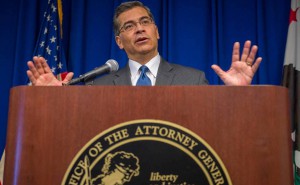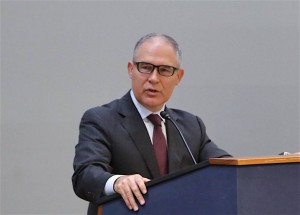
California Attorney General Xavier Becerra and 16 other Attorneys General sued the EPA over CAFE mandates.
Less than 24 hours. That’s how long it took for California and 16 other states to respond to the Environmental Protection Agency’s plan to roll back fuel economy standards and revoke California’s ability to set its own mileage and emissions mandates.
The 17 states filed suit in the United States Court of Appeals for the District of Columbia Circuit. The move was led by California Attorney General Xavier Becerra, and the suit alleges that that the U.S. Environmental Protection Agency’s effort to roll back the stringent gas mileage rules that were adopted by former President Barack Obama’s administration is “unlawful.”
California was joined by Connecticut, Delaware, Illinois, Iowa, Maine, Maryland, Massachusetts, New Jersey, New York, Oregon, Pennsylvania, Rhode Island, Vermont, Virginia, Washington and the District of Columbia.
Minnesota also joined the lawsuit through its Pollution Control Agency and Department of Transportation.
(EPA reportedly wants 25% cut in fuel economy. Click Here for the story.)
“The evidence is irrefutable: today’s clean car standards are achievable, science-based and a boon for hardworking American families. But the EPA and Administrator Scott Pruitt refuse to do their job and enforce these standards,” Becerra said in a statement.
“Enough is enough. We’re not looking to pick a fight with the Trump Administration, but when the stakes are this high for our families’ health and our economic prosperity, we have a responsibility to do what is necessary to defend them.”
Scott Pruitt, the former Attorney General for Oklahoma and a long-time critic of the EPA, is the new head of the agency and unveiled a plan yesterday that finally brought the long-awaited conflict between California and the Trump administration to a head.
Pruitt has repeatedly signaled a desire to roll back the rules set under the Obama Administration that current target a fuel economy average of 54.5 mpg by 2025. Reports based on sources at the environmental agency indicate that would drop to 41.7 mpg, the figure that the phase-in of the Obama rules would have reached by 2020. There would be no further increase, under the proposal, until 2026.
(Click Here for more about the court ordering the EPA to reinstate fines for missing CAFE.)
Perhaps the most controversial part of the Pruitt’s draft memo is the portion that would forbid California from taking steps on its own to effectively neuter the rollback. Under current law the state can set tougher tailpipe rules than the EPA and other states can adopt California’s guideline, something that could effectively require automakers to stick with the current CAFE rules.
Under law, the EPA has to come to an agreement with the National Highway Traffic Safety Administration over any revision to the Corporate Average Fuel Economy standard.
A final proposal is expected to be issued within the next week, though in an e-mail to the Los Angeles Times, EPA spokesperson Liz Bowman would only say that, “The Agency is continuing to work with NHTSA to develop a joint proposed rule and is looking forward to the interagency process.”
During his tenure as Oklahoma’s AG, Pruitt sued the EPA several times claiming the agency had overstepped its bounds. Upon taking the top spot in the agency, Pruitt has already begun to undo some Obama-era programs, now including the Corporate Average Fuel Economy standards calling for cuts down to 41.7 mpg.
(To see more about the study that finds strong support for keeping tougher fuel economy rules, Click Here.)
In a letter to Pruitt, Sen. Tom Carper (D-Delaware) wrote, “Such a proposal, if finalized, would harm U.S. national and economic security, undermine efforts to combat global warming pollution, create regulatory and manufacturing uncertainty for the automobile industry and unnecessary litigation, increase the amount of gasoline consumers would have to buy, and runs counter to statements that both of you have made to members of Congress.”

